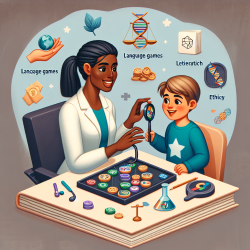Introduction
The COVID-19 pandemic has had far-reaching impacts across the globe, affecting various sectors and industries. One such impact has been the increase in rice prices, which has had significant effects on household welfare in Papua New Guinea (PNG). As a practitioner in the field of speech-language pathology, you might wonder how these economic changes can be relevant to your practice. This blog will explore the implications of the research conducted by Schmidt et al. (2021) on the impacts of COVID-19 induced income and rice price shocks in PNG and how you can leverage this information to improve your practice and outcomes for children.
Understanding the Research
The study by Schmidt et al. (2021) utilized data from a 2018 rural household survey in PNG to estimate the effects of a 25% increase in rice prices on household welfare. The research highlighted that such an increase would reduce total rice consumption in PNG by 14% and impact the poorest households the most. The study also considered the effects of a potential 12% decrease in household incomes due to the COVID-19 economic slowdown, predicting a further reduction in rice consumption among urban and rural poor households by 20% and 17%, respectively.
Implications for Speech-Language Pathology
While the study primarily focuses on economic impacts, the findings can be extrapolated to understand the broader implications for child welfare and development. Here are some ways this research can inform your practice:
- Awareness of Economic Stressors: Understanding the economic challenges faced by families can help you empathize with the stressors that may affect a child's learning and development. Economic hardships can lead to food insecurity, which in turn can impact a child's cognitive and language development.
- Holistic Approach: Incorporate a holistic approach in your therapy sessions by considering the socio-economic background of the children you work with. This can help tailor your interventions to be more effective and relevant.
- Advocacy and Support: Use the data to advocate for policies and programs that support families in need. By understanding the economic challenges, you can better support families in accessing resources that can alleviate some of the burdens they face.
Encouraging Further Research
The study by Schmidt et al. (2021) is a valuable resource for understanding the impacts of economic changes on household welfare. However, there is a need for further research to explore the specific impacts on child development and educational outcomes. As a practitioner, you can contribute to this body of research by documenting and sharing your observations and experiences with colleagues and researchers.
Conclusion
The impacts of COVID-19 induced rice price shocks in PNG highlight the interconnectedness of economic and social factors in child development. By understanding these dynamics, you can enhance your practice and contribute to better outcomes for children. To delve deeper into the research and its findings, I encourage you to read the original research paper: Impacts of COVID-19 induced income and rice price shocks on household welfare in Papua New Guinea: Household model estimates.










